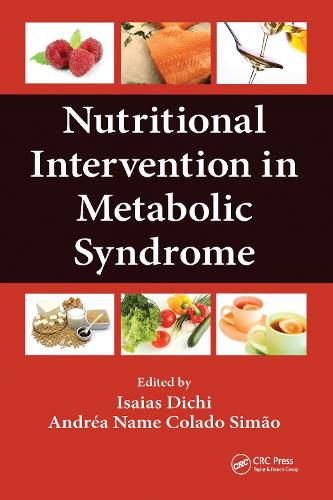Readings Newsletter
Become a Readings Member to make your shopping experience even easier.
Sign in or sign up for free!
You’re not far away from qualifying for FREE standard shipping within Australia
You’ve qualified for FREE standard shipping within Australia
The cart is loading…






The prevalence of metabolic syndrome (MS) is rising in developing countries and developed countries at such high rates that it is now considered a worldwide public health problem of pandemic proportions. Yet its spread can usually be mitigated by diet and lifestyle behavior. Nutritional Intervention in Metabolic Syndrome brings together coverage of dietary patterns and dietary components to create a complete understanding of the mechanisms by which these diets and components may improve metabolic syndrome. It then presents information on how to treat MS through lifestyle change and nutritional intervention.
Witten by experts, the book focuses on diet therapy, nutritional intervention, and oxidative stress in metabolic syndrome. It presents information on dietary patterns in metabolic syndrome, including Mediterranean style diets, DASH, and low calorie diets. The text then provides an understanding of the physiopathology mechanisms in metabolic syndrome and strategies to treat these conditions through nutritional intervention. Chapters cover prevalence of MS, pathophysiology, MS in systemic lupus erythematosus and rheumatoid arthritis, gene-nutrient interactions, MS in adolescents and children, lifestyle change and physical activity, and various effects of dietary components in MS.
Research studies examining food groups are important, and there is a trend in the literature to verify the relationship between dietary patterns and cardiovascular risk factors. However, studies examining dietary components, such as olive oil, soy-based products, n-3 polyunsaturated fatty acids, berries, whole grains, nuts, dairy foods, tea, coffee, and alcoholic beverages are also important. The coverage of both in this book gives you an understanding of the pathophysiology underlying MS that you can use to develop strategies to prevent and treat these conditions through nutritional intervention.
$9.00 standard shipping within Australia
FREE standard shipping within Australia for orders over $100.00
Express & International shipping calculated at checkout
The prevalence of metabolic syndrome (MS) is rising in developing countries and developed countries at such high rates that it is now considered a worldwide public health problem of pandemic proportions. Yet its spread can usually be mitigated by diet and lifestyle behavior. Nutritional Intervention in Metabolic Syndrome brings together coverage of dietary patterns and dietary components to create a complete understanding of the mechanisms by which these diets and components may improve metabolic syndrome. It then presents information on how to treat MS through lifestyle change and nutritional intervention.
Witten by experts, the book focuses on diet therapy, nutritional intervention, and oxidative stress in metabolic syndrome. It presents information on dietary patterns in metabolic syndrome, including Mediterranean style diets, DASH, and low calorie diets. The text then provides an understanding of the physiopathology mechanisms in metabolic syndrome and strategies to treat these conditions through nutritional intervention. Chapters cover prevalence of MS, pathophysiology, MS in systemic lupus erythematosus and rheumatoid arthritis, gene-nutrient interactions, MS in adolescents and children, lifestyle change and physical activity, and various effects of dietary components in MS.
Research studies examining food groups are important, and there is a trend in the literature to verify the relationship between dietary patterns and cardiovascular risk factors. However, studies examining dietary components, such as olive oil, soy-based products, n-3 polyunsaturated fatty acids, berries, whole grains, nuts, dairy foods, tea, coffee, and alcoholic beverages are also important. The coverage of both in this book gives you an understanding of the pathophysiology underlying MS that you can use to develop strategies to prevent and treat these conditions through nutritional intervention.